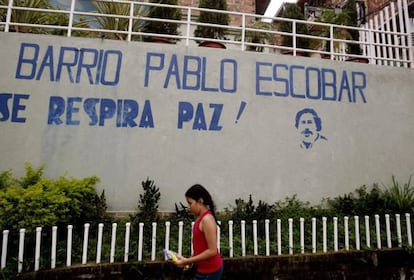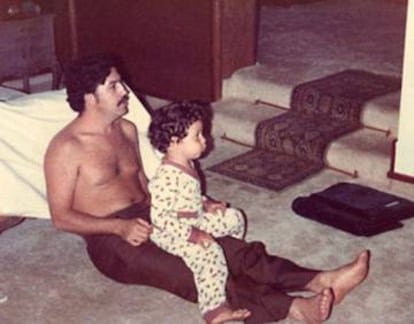Pablo Escobar’s Medellín HQ to be demolished
Mayor says building that once housed drug lord’s operations to become park honoring victims

For years, the Colombian city of Medellín – the country’s second largest – has been trying to shake its global image as a hotspot for drug trafficking. More than two decades after the death of the infamous drug lord Pablo Escobar, the city is enjoying a renaissance and has become a model of urban renewal, thanks in part to a public transportation system that is the envy of Latin America.

But the past clings on: travelling from the airport to a recent investment conference, a taxi driver points out some of the local sights, including the building-cum-museum of the notorious 1980s drug trafficker, which has become a prime destination for so-called narcotourism, driven in part by the interest inspired by television shows like Narcos, based on the life of Escobar.
Now, however, local authorities are keen to polish up their image even further with Medellín mayor Federico Gutiérrez Zuluaga saying he wants to “tear down the symbol of violence” that is the Mónaco building, once the base of operations of Escobar, who at one time controlled almost all of the lucrative cocaine trade into the United States.
Once one of the world’s most-wanted drug traffickers, Escobar was notorious for having Colombian politicians and judges routinely and brutally killed. According to government estimates, Escobar, who was gunned down in 1993 at the age of 44, was responsible for more than 20,000 deaths.
We are never going to deny our history; we are going to tell it how it is, from the victim’s side Medellín mayor Federico Gutiérrez Zuluaga
“Changing and removing these symbols of terror, of drug trafficking, is important in any society,” said Zuluaga, announcing his plans to destroy the Escobar building. “If you don’t tell the story, they tell the story for you,” he told journalists, referring to the city’s “dark past.”
“We are never going to deny our history; we are going to tell it how it is, from the side of the victims,” the mayor added, saying that the demolition of the Escobar headquarters was also a symbolic action signifying the “destruction of this illegal, mafia culture.”
For the site of the Mónaco building, located in the city’s El Poblado district, city authorities are planning a park honoring the thousands of victims of the drug trade including “civilians, police officers, soldiers, judges and many people who died in the era of violence,” according to Zuluaga.

The site will be “a symbol of the rebirth of Medellín, the politician said, adding that exhibition space would be set aside at the city’s Casa de la Memoria museum where “the real story can be told.”
There is a speed bump in the plans though. The site of the Mónaco building is currently controlled by Medellín’s security forces and plans were afoot to turn it into the head of police intelligence operations – a move opposed by Zuluaga. But the mayor says he now has the backing of police chief Jorge Hernando Nieto for his plans for a park. The two sides were now working through various “legal issues,” the mayor said.
English version by George Mills.
Tu suscripción se está usando en otro dispositivo
¿Quieres añadir otro usuario a tu suscripción?
Si continúas leyendo en este dispositivo, no se podrá leer en el otro.
FlechaTu suscripción se está usando en otro dispositivo y solo puedes acceder a EL PAÍS desde un dispositivo a la vez.
Si quieres compartir tu cuenta, cambia tu suscripción a la modalidad Premium, así podrás añadir otro usuario. Cada uno accederá con su propia cuenta de email, lo que os permitirá personalizar vuestra experiencia en EL PAÍS.
¿Tienes una suscripción de empresa? Accede aquí para contratar más cuentas.
En el caso de no saber quién está usando tu cuenta, te recomendamos cambiar tu contraseña aquí.
Si decides continuar compartiendo tu cuenta, este mensaje se mostrará en tu dispositivo y en el de la otra persona que está usando tu cuenta de forma indefinida, afectando a tu experiencia de lectura. Puedes consultar aquí los términos y condiciones de la suscripción digital.








































